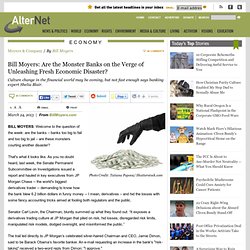

The $23 trillion credit bubble in China is starting to collapse – global financial crisis next? Should There Be a Maximum Wage? by Mark Engler. Countries like Egypt and Switzerland have placed regulations on how much executives can earn.

Here’s why the U.S. should consider doing the same. posted Jun 27, 2013 This article originally appeared in The New Internationalist. Should our societies have a "maximum wage"? Would the world be better off if the United States had one? Currently, Americans are debating raising the national minimum wage from $7.25 per hour to $10 per hour over the next two years.
Such limits would motivate CEOs to augment the pay of their workers because their own raises would depend on it. Back in 1967, the U.S. minimum wage was $1.40 per hour. Economic productivity is an even bigger part of the story. Who has walked away with the proceeds from all that productivity? A January report from Oxfam noted, “The richest one percent has increased its income by 60 percent in the last 20 years.” Other countries provide precedent for such a policy. Economists love to talk about incentives. Read More: The Financial and Environmental Crises are Connected. By Amy Larkin – July 16, 2013 The new math for the new accounting Currently, the laws of nature and the rules of business are in direct collision.

Every financial transaction has an environmental impact and the environment is embedded in every financial transaction. But these environmental impacts are not yet included in business rules, regulations or accounting. This omission has left society with a massive environmental debt. Photo by spleeness/FlickrThe aftermath of Hurricane Sandy, New Jersey. In my book, Environmental Debt: The Hidden Costs of a Changing Global Economy, I expose the link between our financial and environmental crises — from the cost of coal to the impacts of extreme weather on taxpayers. For example, China recently calculated that its annual environmental degradation costs it 3.5 percent of its GDP, or about $250 billion a year. These changes would lead to a future where a business’ return on investment would be aligned with the survival of nature.
Bill Moyers: Are the Monster Banks on the Verge of Unleashing Fresh Economic Disaster? Photo Credit: Tatiana Popova/ Shutterstock.com March 24, 2013 | Like this article?

Join our email list: Stay up to date with the latest headlines via email. From BillMoyers.com BILL MOYERS: Welcome to the question of the week: are the banks – banks too big to fail and too big to jail – are these monsters courting another disaster? That's what it looks like. Senator Carl Levin, the Chairman, bluntly summed up what they found out: “It exposes a derivatives trading culture at JP Morgan that piled on risk, hid losses, disregarded risk limits, manipulated risk models, dodged oversight, and misinformed the public.” The trail led directly to JP Morgan’s celebrated silver-haired Chairman and CEO, Jamie Dimon, said to be Barack Obama’s favorite banker. Among the many of us who will be anxiously awaiting those revelations, should they come, is my guest, Sheila Bair. The 147 People Destroying the World. JPMorgan Chase's board "strongly" endorsed Jamie Dimon, pictured June 19, 2012, to continue serving as both chairman and chief executive despite last year's embarrassing $6.2 billion trading loss in the "London Whale" debacle.

March 25, 2013 | Like this article? Join our email list: Stay up to date with the latest headlines via email. Can 147 people perpetuate economic injustice – and make it even worse? There must be some explanation for last week’s economic madness. Cyprus: The European Union acted destructively – and self-destructively – when it tried to seize a portion of the insured savings accounts of the citizens of Cyprus. That didn’t just create a political firestorm in Cyprus. The Grand Bargain: The President and Congressional Republicans reportedly moved closer to a deal that would cut Social Security and Medicare while raising taxes – mostly on the middle class – without doing more to create jobs. There’s more: